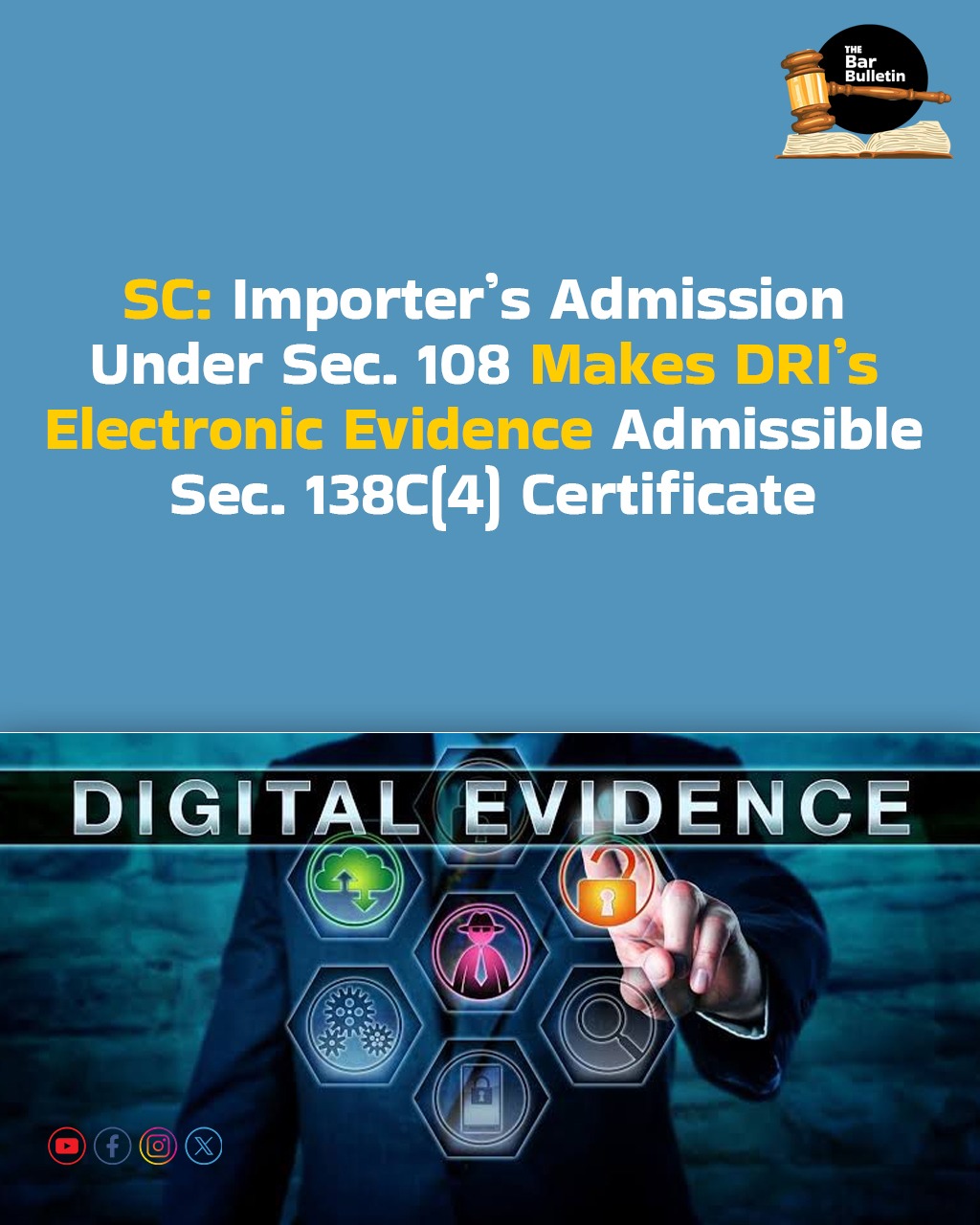Considering the Record of Proceedings duly signed by the respondents-importers, including their various statements recorded under Section 108 of the Customs Act, the Supreme Court clarified that when there was due compliance with Section 138C(4) of the Customs Act, which meant that a particular certificate stricto senso in accordance with Section 138C(4) must necessarily be on record, and at no point of time the statements recorded under Section 108 were retracted, the evidentiary value of such statements shall not be discarded.
The Apex Court therefore ruled that the electronic evidence seized by the Directorate of Revenue Intelligence (DRI) is admissible even without a certificate under Section 138C(4), when the importer has duly acknowledged these documents in devices in their statements recorded under Section 108 of the Customs Act.
The Division Bench comprising Justice J B Pardiwala and Justice KV Viswanathan observed that Section 138C(4) makes it abundantly clear that if any statement is to be read into evidence and such documents are computer printouts, then a certificate has to be obtained in accordance with (a), (b), and (c) of sub-section 4. The Indian Evidence Act also declares that the expressions “Certifying Authority”, “electronic signature”, “Electronic Signature Certificate”, “electronic form”, “electronic records”, “information”, “secure electronic record”, “secure digital signature”, and “subscriber” shall have the meanings respectively assigned to them in the Information Technology Act.
Though Section 65B4 of the Evidence Act is mandatory, the Bench clarified that it would all depend on the facts of each case, and how the same could be said to have been duly complied with. Reference was made to the decision in the case of Arjun Panditrao Khotkar v. Kailash Kushanrao Gorantyal and Others [(2020) 7 SSC 1], where it was held that “the respondents had done everything possible to obtain the necessary certificate which was to be given by a third party over whom the respondents therein had no control and, in such circumstances, must be relieved of the mandatory obligation contained in the said subsection”.
Briefly, in this case, the respondents are engaged in the business of importing branded food items from various countries, and after the import of the branded food items, they were being sold in Delhi and Mumbai, respectively. When the business as well as the residential premises of the respondents were raided, and an extensive search was undertaken by the officials of the department, the department was able to procure evidence which, prima facie, established that the respondents had short-paid the duty on the import of the goods in question. The investigation revealed that while filing the Bills of Entry for the imported goods, there was a failure to declare the actual RSP/MRP at which the goods were being sold to the ultimate consumers. Forming an opinion on the declaration of lower RSP/MRP by the importers resulting in evasion of duties, a show cause notice came to be issued as to why the demand for differential duties of Rs. 9.24 crores and Rs. 9.83 lacs should not be recovered from the respondent.
The Adjudicating Authority and the Commissioner confirmed the show cause notice and thereby raised a demand with interest and penalty. When the matter reached the CESTAT, it was concluded that the documents relied upon by the department for the purpose of proceeding against the respondents could not have been made admissible in evidence, in view of non-compliance with the provision of Section 138C(4) of the Customs Act. This led the Customs Department to approach the Apex Court.
Appearances:
ASG Vikramjeet Banerjee, Senior Advocate Nachiketa Joshi & Nisha Bagchi, AOR Gurmeet Singh Makker, along with Advocates Digvijay Dam, Amit Sharma B., and Shaurya R Rai, for the Appellant/ Revenue
AOR Wattan Sharma, along with Advocates Ashish Batra, Amit K. Nain, and Kartik Yadav, for the Respondent/ Taxpayer


One thought on “SC: Importer’s Admission Under Sec. 108 Makes DRI’s Electronic Evidence Admissible Without Sec. 138C(4) Certificate”
Pingback: Tax Law Highlights – Supreme Court & High Court Judgments | September 2025